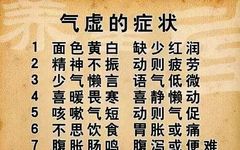Qi deficiency refers to a series of pathological changes and symptoms caused by insufficient vital energy. The term “Qi” represents the most fundamental substance in the human body, formed by the combination of the essence from the kidneys, the Qi derived from the spleen and stomach’s absorption and transformation of food, and the clear Qi inhaled by the lungs.
Qi deficiency generally indicates a state of physical weakness, pale complexion, shortness of breath, fatigue in the limbs, dizziness, spontaneous sweating upon exertion, and a low voice. This includes the deficiency of Yuan Qi (元气, original Qi), Zong Qi (宗气, ancestral Qi), and Wei Qi (卫气, defensive Qi), as well as a reduction in the functions of Qi in promoting, warming, defending, consolidating, and transforming, leading to a decline in certain bodily functions and a weakened ability to resist diseases.
Fundamentally, human life activities are characterized by the movement of Yuan Qi in and out. Qi deficiency is a common condition, often resulting from congenital insufficiency, malnutrition, aging, prolonged illness, major surgeries, or excessive fatigue. Clinically, Qi deficiency also includes symptoms of lung Qi deficiency, heart Qi deficiency, spleen Qi deficiency, and kidney Qi deficiency.
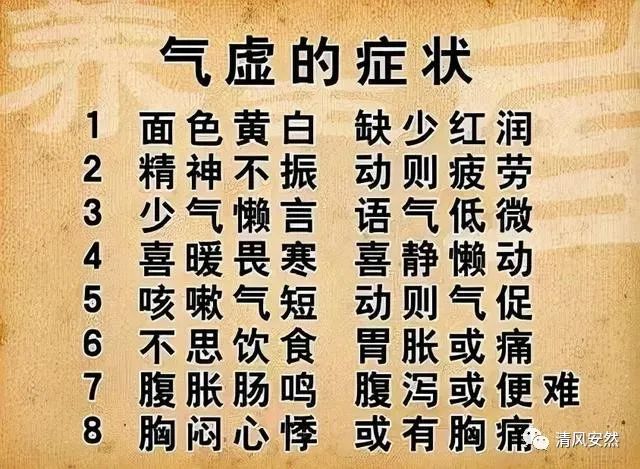
What symptoms do people with Qi deficiency exhibit?
What manifestations are present in individuals with a Qi deficiency constitution?
Generally, they have a dull complexion and poor physical strength.
People with Qi deficiency typically have a pale, lackluster complexion, and are prone to spontaneous sweating and shortness of breath. In contrast, those with sufficient Qi can climb several flights of stairs without issue, while those with Qi deficiency may feel breathless after just a few flights, with a rapid heartbeat.
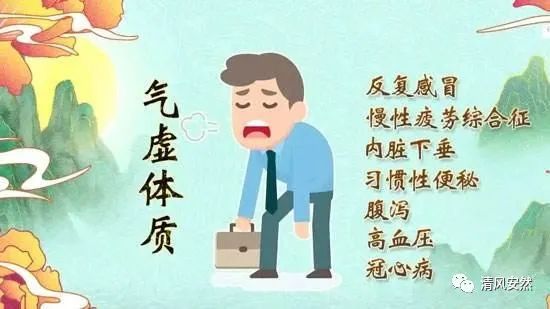
They are often taciturn and easily fatigued.
Individuals with Qi deficiency tend to be quiet and reluctant to speak, unlike those with sufficient Qi who are energetic and actively participate in activities and express opinions. Qi deficient individuals prefer to avoid unnecessary interactions. What does being taciturn mean? It means that when you talk to them, they are reluctant to respond, and even a few extra words can tire them out.
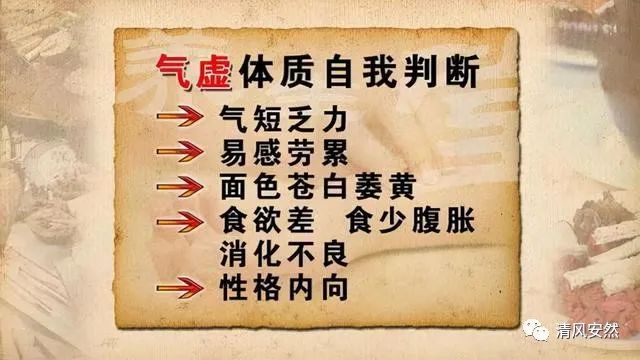
People with Qi deficiency are also prone to fatigue, feeling tired all the time. After a short walk, they may feel exhausted while others do not. They often appear slouched, seeking support when standing or sitting, lacking vitality. In contrast, those with sufficient Qi stand tall and sit upright. I once observed a martial arts star who truly embodied the saying “standing like a pine, sitting like a bell,” with a strong voice.
They are sensitive to cold and wind, making them prone to colds.
Individuals with Qi deficiency are sensitive to cold and wind, unable to tolerate even slight chills, often sneezing and catching colds easily, especially children. Some children may recover from a cold only to catch another after a brief visit to kindergarten, leaving their families worried about their health. This is actually a manifestation of Qi deficiency.
In summary, Qi deficiency involves insufficient kidney Qi, spleen Qi, and lung Qi. Among these, kidney Qi is inherited from the mother, varying in abundance. Additionally, spleen Qi is crucial; often, it is the deficiency of spleen Qi that leads to insufficient lung Qi, making those with spleen Qi deficiency more susceptible to external pathogens.
They experience bloating after eating.
Individuals with Qi deficiency often experience abdominal bloating after meals because their spleen struggles to transform food effectively. Food that cannot be properly processed lingers in the body, causing bloating.
They have loose stools.
People with Qi deficiency often have difficulty forming stools, as their Qi lacks the strength to hold the stool, leading to easy slippage.
What does the tongue of a person with Qi deficiency look like?
(1) Individuals with tooth marks on their tongues are often Qi deficient.
People with Qi deficiency typically have tooth marks on their tongues—imprints from their teeth. Why is this? Because Qi deficient individuals have a lot of dampness that has not been expelled from their bodies, which over time can lead to swelling of internal organs and skin. However, this swelling is not usually visible, as we cannot see the swelling of internal organs, and the swelling of the skin is often not very pronounced. However, a swollen tongue, which is pressed against the teeth for 24 hours, will show many imprints when extended.
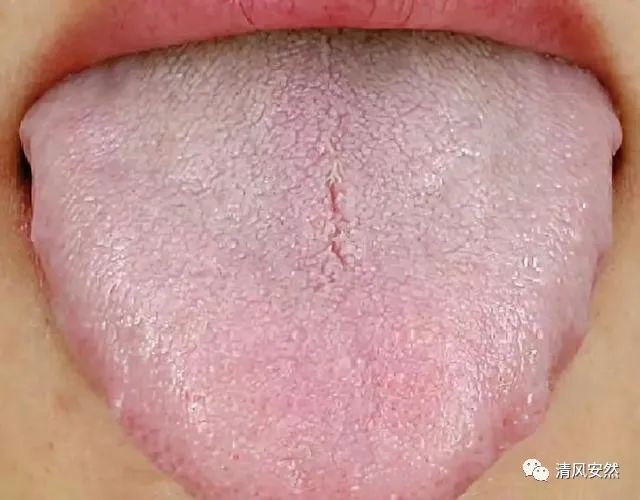
(2) A tongue coating that covers the entire tongue indicates heavy internal dampness.
Generally, a normal tongue coating should reveal the tongue body. However, a certain type of tongue coating can cover the entire tongue, completely obscuring the tongue body, which in TCM is referred to as a “full tongue coating,” indicating significant internal dampness. The distinction between a full tongue coating and a pale tongue body can be confusing; for example, if the tongue body is originally light red but appears very white, matching the color of the coating, it may seem like a full coating. The key to distinguishing between a full coating and a pale tongue body is to observe whether the coating covers the edges of the tongue. If it does, then it is a full coating. If the tongue is not completely covered by the coating and is pale, then it indicates a pale tongue body.

(3) The thicker the tongue coating, the heavier the internal dampness.
In addition to a full tongue coating, the thickness of the coating can also indicate the severity of internal dampness. A thin coating, even if it covers the entire tongue, suggests that internal dampness is not severe; as the coating thickens, it indicates increasing dampness. If it becomes thick enough, the dampness can condense into a viscous substance, referred to in TCM as phlegm (痰), which is not necessarily the phlegm that is coughed up. At this point, the coating will appear both white and thick. When the coating is thin, it is relatively easy to eliminate internal dampness; however, if the coating is thick, it becomes more challenging to remove dampness, so the thicker the coating, the more attention we need to pay.
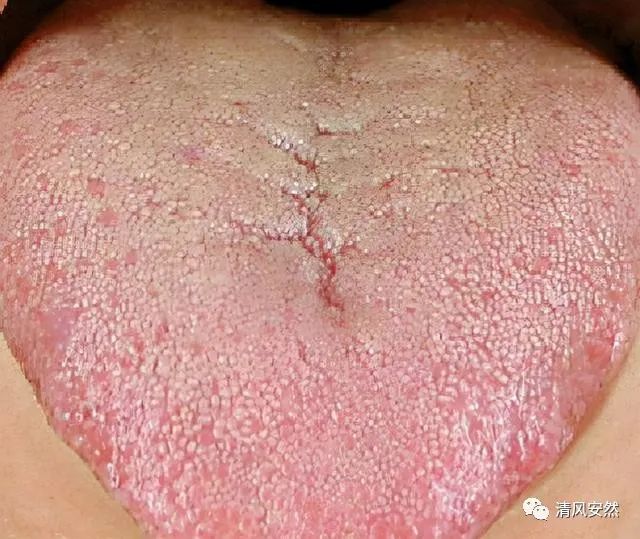
(4) A tongue with cracks in the middle indicates spleen and stomach Qi deficiency.
If the tooth marks on the sides of the tongue are not prominent, but there are very noticeable cracks in the middle (everyone has cracks in the middle of their tongue, but in normal individuals, these cracks are not obvious because the coating covers them, making them barely visible), and if they branch out into various forms, this indicates poor spleen and stomach function, with insufficient spleen Qi unable to nourish the tongue coating, leading to prominent cracks.
In summary, individuals with Qi deficiency often have a swollen tongue, although some may have a thin tongue, but the presence of tooth marks is a sign of Qi deficiency.
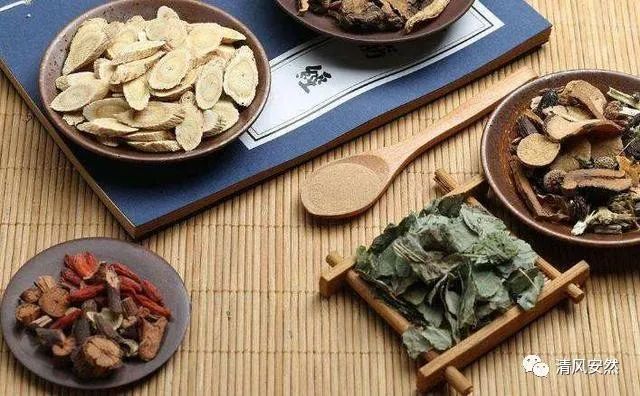
What factors influence Qi deficiency constitution?
1. There is a saying in TCM: “Labor consumes Qi.” This is very insightful. Prolonged labor and work can lead to Qi depletion, resulting in Qi deficiency. Many friends have a misconception that exercise can enhance physical fitness, which is true. However, for many, prolonged exercise can have the opposite effect; instead of feeling invigorated, they feel exhausted after exercising, which aligns with the saying “Labor consumes Qi.”
2. Poor function of the spleen and stomach can lead to inadequate transformation of food and nutrients, resulting in Qi deficiency. Nowadays, many young women pursue beauty, aiming for a slender figure, leading to malnutrition, pale skin, and severe Qi deficiency.
3. The impact of diseases is also a factor leading to Qi deficiency. Some individuals who have suffered from major illnesses or undergone surgeries may have depleted their vital energy, resulting in a Qi deficient constitution.
What can be done for Qi deficiency constitution? Here are four key words:
Tonify the Middle and Benefit Qi
To benefit Qi, one must first tonify the middle, which means nourishing the Qi of the spleen and stomach, replenishing your postnatal foundation.
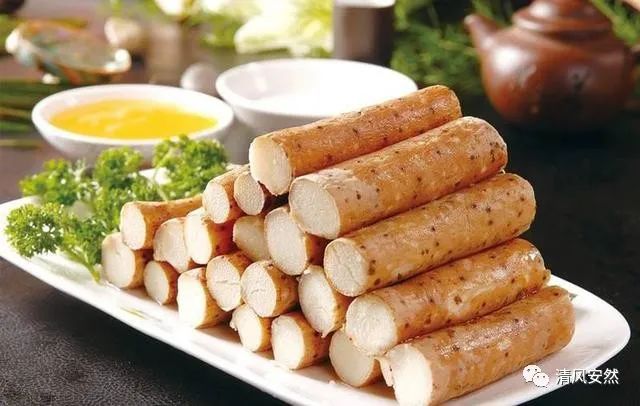
Huai Shan Yao (怀山药) refers to the yam produced in the Jiaozuo region of Henan, particularly the best varieties from Wenxian, Qinyang, Wuzhi, and Boai.
Properties and Channels: Sweet in flavor, neutral in nature. It enters the spleen, lung, and kidney channels.
Functions: Tonifies the spleen, nourishes the stomach, generates fluids, benefits the lungs, and tonifies the kidneys.
There are many ways to consume yam. For those with spleen and stomach deficiency, use 200 grams of fresh yam, 30 grams of jujube, and an appropriate amount of glutinous rice to cook porridge, adding sugar to taste; or use 100 grams of fresh yam and 50 grams of millet to cook porridge with sugar; alternatively, yam can be cooked with lentils, lotus seeds, etc. For symptoms of lung deficiency with chronic cough or kidney deficiency with nocturnal emissions, 10 grams of fresh yam can be mashed and mixed with half a cup of sugarcane juice and heated for consumption; yam can also be consumed as juice. Yam is a nourishing food with astringent properties, but those with damp-heat or constipation should avoid excessive consumption.
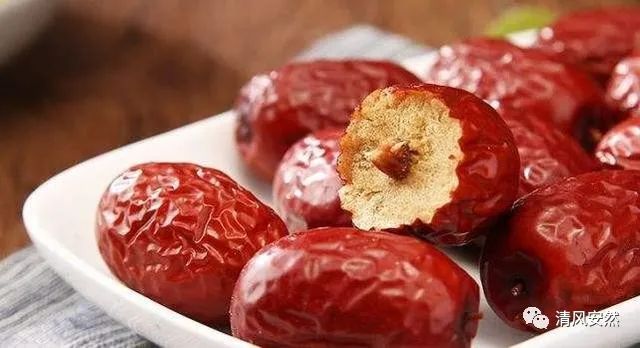
Jujube (大枣), also known as red date, dry date, or jujube fruit, originated in China and has a cultivation history of over four thousand years. It has been listed as one of the “Five Fruits” (桃, 李, 梅, 杏, 枣) since ancient times. Red dates are rich in protein, fat, carbohydrates, carotene, B vitamins, vitamin C, vitamin P, as well as calcium, phosphorus, iron, and adenosine monophosphate.
The adenosine monophosphate found in red dates is essential for cellular energy metabolism, enhancing muscle strength, alleviating fatigue, dilating blood vessels, increasing myocardial contractility, and improving myocardial nutrition, which is beneficial for preventing and treating cardiovascular diseases. According to TCM theory, red dates have the effects of tonifying deficiency, benefiting Qi, nourishing blood, calming the spirit, and strengthening the spleen and stomach, making them an excellent health food for those with spleen and stomach deficiency, insufficient Qi and blood, fatigue, and insomnia. Red dates are also effective for chronic hepatitis, liver cirrhosis, anemia, and allergic purpura. They contain triterpenoid compounds and adenosine monophosphate, which have strong anti-cancer and anti-allergic properties. Notable varieties of red dates in China include Wufu dates, Shandong dates, Sihong dates, Jin Si dates, Zanhua dates, Hami dates, and Xinzheng dates.
Properties and Channels: Sweet in flavor, warm in nature. It enters the spleen and stomach channels.
Functions: Tonifies the middle, benefits Qi, nourishes blood, and calms the spirit. It is used for spleen deficiency with poor appetite, fatigue, and loose stools, as well as for women with irritability.
Daily Care for Qi Deficiency Constitution
1. Pay attention to keeping warm, avoid sweating in the wind, and prevent invasion by external pathogens.
2. Engage in appropriate exercise to promote the circulation of Qi and blood, gently moving the limbs to enhance spleen and stomach function and improve Qi deficiency.
3. Be particularly careful not to overwork, as this can further deplete vital energy.
4. Develop good sleep habits, going to bed before 11 PM, and avoid staying up late.

Exercise Recommendations for Qi Deficiency Constitution
Individuals with Qi deficiency should avoid intense physical exercise, opting for moderate amounts of exercise, gradually increasing intensity, and maintaining consistency. Low-intensity, high-frequency exercise is recommended, with appropriate increases in frequency while reducing the total load of each session, controlling exercise duration, and gradually extending exercise time, such as walking for 30-60 minutes daily, gradually increasing the duration based on personal condition. High-load exercises and those causing excessive sweating should be avoided, as well as actions requiring forceful exertion or prolonged breath-holding, to prevent depleting vital energy.

Fruits: Fruits with nourishing properties such as peanuts, fox nuts, and yams; fruits with neutral properties such as oranges, grapes, bayberries, hawthorn, and olives.
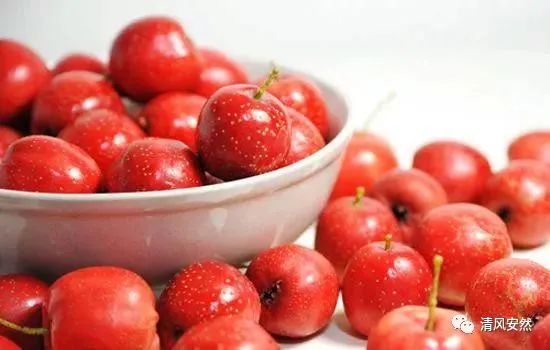
Grains: Grains with nourishing properties such as millet, japonica rice, glutinous rice, bran, lentils, and sweet potatoes; neutral grains such as rice, corn, yams, and peas.

Meats: Meats with nourishing properties such as beef, rabbit, pork stomach, chicken, eggs, whitefish, shark, knife fish, yellow croaker, and flatfish; neutral meats such as duck, goose, pigeon, quail, pork kidneys, pig trotters, and donkey meat.
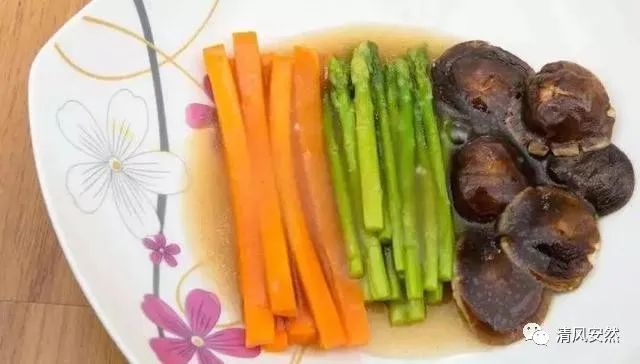
Vegetables: Vegetables with nourishing properties such as cauliflower, carrots, and shiitake mushrooms; neutral vegetables such as spinach, black fungus, white fungus, mushrooms, and lion’s mane mushrooms.

